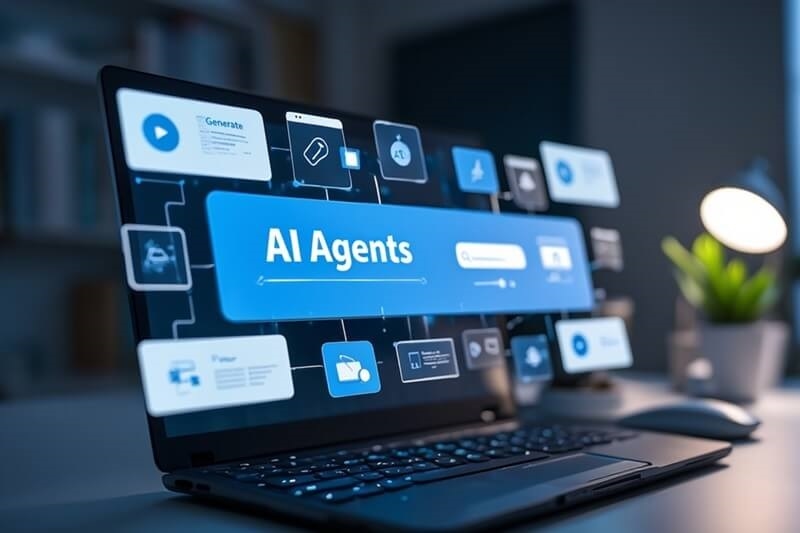
The automation space has finally outgrown its kiddie pool. We’re now in the era of the ai agent builder, where software doesn’t just respond — it acts, learns, and outsmarts your to-do list without asking. This is bigger than scheduled workflows. This is about letting intelligent agents run and expand your digital business footprint while you focus on strategy (or sleep in).
The term ai agent builder isn’t just a hype label; it’s the foundation of modern execution engines. Think of it as a creation suite where you design thinking systems, agents that can fetch data, make decisions, call APIs, ping humans, and even collaborate with other agents when a task gets gnarly.
Traditional automation tools hardcode workflows. An ai agent builder uses intelligent components and modular thinking so your system self-adapts. Native memory, reasoning loops, contextual prompts, and goal-based logic, that’s what separates an agent from a dumb bot.
Superpower move? Pairing the ai agent builder model with evolving ai agent frameworks, so you don’t start from scratch every time you need to build a new digital worker.
Discover More: The Future of Artificial Intelligence and the Internet

Here’s where rookies mess up: they write logic from zero. Smart builders use ai agent frameworks like LangChain, AutoGen, CrewAI, and Rasa to speed-run the heavy lifting:
Use these ai agent frameworks twice, once for prototyping tasks, then again for scaling enterprise-ready agents. The difference? Security, performance, and modularity.
Frameworks aren’t optional anymore; they’re the backbone that makes your ai agent builder worth its price tag.
Let’s talk ai agent useful case study, real dollars, not theory.
A Fortune-500 HR tech company deployed agents built via a customized ai agent builder. One agent handled applicant sourcing. Another scheduled interviews. A third ranked resumes using fit scores and escalated only the top 5% to human recruiters.
Results?
That’s a textbook ai agent useful case study. Not because it was fancy, but because it worked. Which is exactly why CFOs, CMOs, and COOs are pledging bigger budgets to push agent-led task automation in 2025 and beyond.
The travel industry is quietly turning into a testbed for domain-specific agents, with the ai travel agent emerging as a flagship use case.
An ai travel agent doesn’t just fetch flights and hotels. It:
This isn’t your average aggregator, it’s a personal concierge with 24/7 hustle. And as consumers get used to that kind of self-updating luxury, generic tools will be wiped out. The ai travel agent is about to do to Expedia what Netflix did to Blockbuster.
One platform quietly exploding right now? n8n. With its open workflow architecture and plugin-based logic, it’s practically begging to turn into an n8n ai agent layer.
A properly built n8n ai agent can:
Tie in vector memory and you get decision-making automation that improves over time, the holy grail.
Most exciting part? The community has started stacking multiple n8n ai agent modules together, forming miniature digital teams. One to plan, one to execute, and one to report. That’s not just automation, that’s orchestration.
Don’t Miss: AI & IoT: Transform Industries by Smart Integration
We need to retire the idea that automation is about “saving time.” With an ai agent builder, you’re architecting scale. A single agent can run lead-gen. Another can qualify prospects. A third can fire off smart follow-ups.
If every agent can 10× one slice of your business, then stacking them multiplies impact. Suddenly you’re doing what used to require 20 employees, with four properly crafted agents.
Let’s be clear: this isn’t a future thing. It’s already happening. And B2B SaaS brands? They’re going to war over who has the smartest fleet, not the biggest team.
No more static prompts. The big win for tomorrow’s ai agent builder is deep context baked into memory layers and vector databases. Agents should remember, relate, and predict. The more context, the more irreplaceable the agent.
Battles aren’t won with solo soldiers. The most advanced systems use ai agent frameworks that let agents pass tokens, roles, and instructions to each other, eliminating bottlenecks and boosts output.
The best ai agent frameworks are a blend: autonomous execution with safe human override when it matters (compliance, big money, risky actions). That balance is non-negotiable.
The market’s moving fast. You need responsible logic wired in from day one, not retrofitted under scandal. GDPR, SOC2, transparency reports, if your ai agent builder doesn’t support that, you’re playing with fire.
Design once. Deploy multiple times. If your ai agent builder doesn’t support cloning, swapping tools, remixing use-cases, you haven’t built a real system. You’ve just duct-taped automations.
As privacy rules tighten, local compute wins. Agents that run inside devices (not datacenters) will crack open new offline, high-speed automation.
Horizontal is dead. The winners will be domain-focused builds — healthcare agent builders, fintech agent builders, logistics agent builders, ai travel agent, etc.
Agents that not only act, but debug themselves in-flight using a feedback loop. We’re moving toward a world where workflows fix themselves while you’re at brunch.
From single agent to entire digital departments — powered by smart ai agent frameworks that let your marketing agent talk to your CRM agent, who syncs with your analytics agent, who informs your n8n ai agent to launch the next campaign while you’re on vacation.
Building digital agents isn’t just for deep-pocketed tech giants anymore. Open source code + accessible ai agent builder platforms + mature ai agent frameworks = chaotic advantage for anyone willing to move fast.
Here’s the punchline: Two years from now, the brands that dominate Google, inboxes, marketplaces, and buyer DMs won’t be doing it manually. They'll be powered by silent fleets of agents making micro-decisions every minute, optimized for outcomes, not effort.
Want your business at the front of that wave?
Start with one ai agent useful case study, then double down. Create your ai travel agent. Deploy your n8n ai agent. Then stack until you’ve built a digital engine room with zero off-days.
Also Check: Quantum Internet Speed: Future, Companies & Fiber Outlook
The future of online automation isn’t prettier dashboards or another “productivity tool.” It’s autonomous, context-rich, super-scalable AI agents, built with intention, powered by modern ai agent builders, and structured through resilient ai agent frameworks.
Those who adopt early will multiply their reach without multiplying headcount. Those who sleep on it? Won’t even realize they lost until the agents have already eaten their market share alive.
This content was created by AI